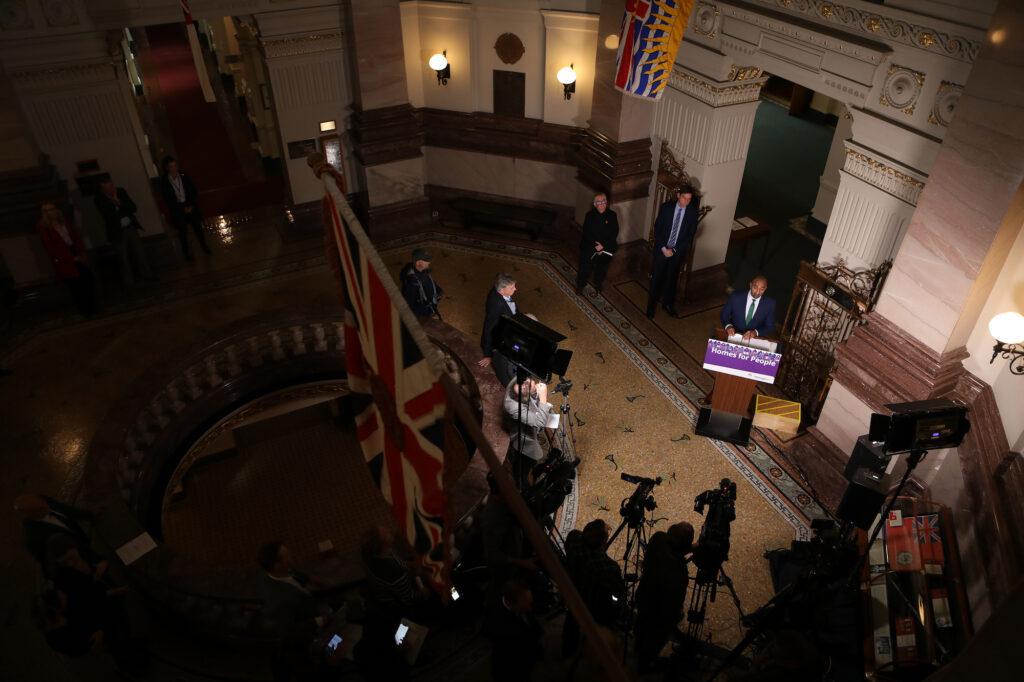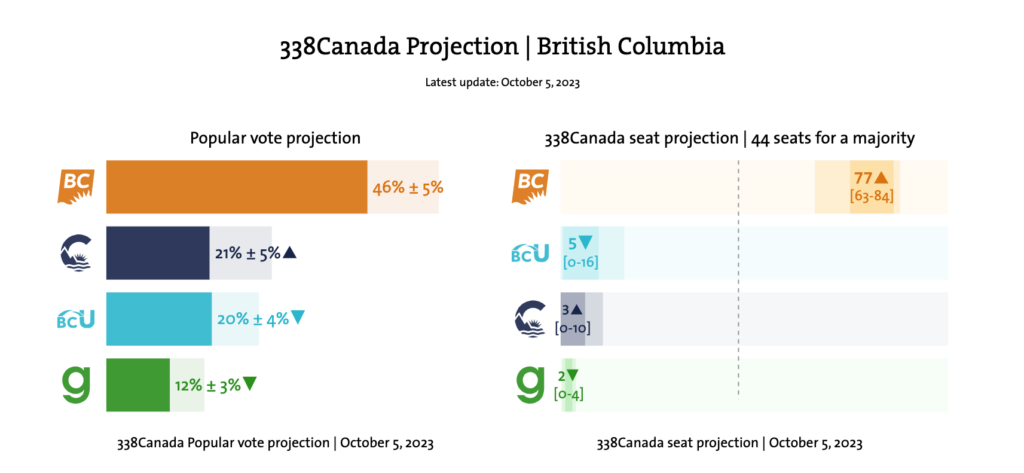On Thursday, November 30, the British Columbia legislative assembly wrapped up the fall sitting ahead of the winter break. The next session will begin in the new year with a Speech from the Throne.
Delivering on commitments
Following long standing commitments made by Premier David Eby on affordable housing, environmental stewardship, worker protections, labour shortages and provincial disaster response, this fall legislative session saw the introduction of numerous transformative pieces of legislation.
There were four housing bills, new emergency management legislation, online platform worker protections, a bill to accelerate electric vehicle adoption, international credential recognition, amendments to the Community and Vancouver Charter affecting homeless encampments and new rules around drug use in public spaces.
The new emergency management legislation responds to the devastating 2023 wildfire season and the increasing incidents of climate related disasters. The new legislation aims to reflect the realities of a changing world including global pandemics, security threats and climate change. It also shifts from focusing exclusively on emergency response to include mitigation, preparation, and recovery. The new legislation formally recognizes First Nations’ inherent right of self-government in relation to emergency management and will be phased in over time to allow for effective collaboration and support of the more than 200 First Nations in the province.
The new legislation for gig workers will categorize those who drive and deliver on app-based services as employees, though they will still be exempt them from most of the requirements under labour law for things like sick pay, vacation time, minimum shifts and overtime. Online platforms are now required to pay into WorkSafeBC so that workers can claim medical benefits if they are injured on the job.
The province also moved legislation to move up the targets for the province’s full adoption of zero-emission vehicles (ZEVs). The amendments require automakers to meet an escalating annual proportion of new light-duty ZEV sales and leases, reaching 26 per cent of light-duty vehicle sales by 2026, 90 per cent by 2030 and 100 per cent by 2035, five years ahead of the original target.
In response to persistent labour shortages, the provincial government is aiming to increase fairness, efficiency, transparency and accountability in the credential recognition process. In order to make it easier and faster for qualified professionals to seek credential recognition, 18 regulatory bodies are required to remove barriers in 29 professions, regardless of where they were trained. The professions include engineers, social workers, veterinarians, paramedics, early childhood educators, teachers, biologists, land surveyors and architects.
Major housing legislation introduced
The first housing bill was the introduction the Short-Term Rental Accommodations Act which proposes to increase fines and strengthen tools for local governments, turn short-term rentals into long-term homes, and establish provincial regulations and enforcement. The act limits short-term rentals to principal residences in municipalities with over 10,000 people with the exemption of tourism-dependent areas. It received royal assent on October 26.
The second housing bill, the Residential Development Amendment Act, permits one secondary suite or one laneway home in all communities throughout B.C. and in communities with more than 5,000 people the act will allow for three to four units on a single-family lot and six units on single-family lots close to busy transit stops.

The third housing bill supports the Residential Development Amendment Act by allowing for upfront zoning Local governments will be required to pre-zone land to meet their housing needs rather than relying on the often-time-consuming process of rezoning and negotiating development cost charges with developers.
The final piece of housing legislation will require local governments to zone for high density near transit hubs. The requirements range from four- to six-stories near a bus exchange to a minimum of twenty stories near a rapid transit station. There has been push back from local governments across the province and this legislation has been interpreted by some as the largest jurisdictional overreach in the province’s history.
Public Safety
The issue of public safety continues as a focal point for people and businesses in all corners of the province. As a result of public outcry from several mayors over the summer, the province banned drug use in public and recreation-focused spaces including near businesses, residential buildings, bus stops, playgrounds, wading pools, skate parks, parks, beaches and sports fields. This move was applauded by mayors and the B.C. Association of Chiefs of Police, though the province’s next move on homelessness was met with much colder reception.
In a Miscellaneous Statutes Amendment Act, Attorney General Niki Sharma included amendments to the Community Charter and the Vancouver Charter that require local governments to provide alternative shelter in situations where they are seeking an injunction to enforce bylaws to clear homeless encampments. Following the controversial clearing of tents and other structures on East Hastings in Vancouver this spring, a number of municipal mayors did not welcome these amendments.
Provincial statutes and local government jurisdiction
One of the common threads in the fall legislation was a perceived encroachment into local jurisdiction to address affordability, enhance public safety and encourage housing starts.
The Union of BC Municipalities (UBCM) has asked the province to withdraw the alternative shelter requirement on injunctions citing it will limit local government’s ability to address public safety concerns. UBCM has also pushed back on the housing legislation and raised concerns that local government’s existing infrastructure challenges will be made even worse. The downstream impacts of this fall’s legislation remain to be seen, but it will inevitably add a complicating factor in the Province’s relationship with local governments who remain an essential partner in advancing the Premier’s ambitious agenda.
2024 election countdown
This was the last fall legislative session before the 2024 provincial election scheduled for October 19, 2024. Premier Eby and the BCNDP have been bolstered by a consistent twenty-five-point lead over the BC United Party and the BC Conservative Party. Most notable in public polling numbers has been the BC Conservative Party surging ahead of the BC United Party who won four back-to-back elections as the erstwhile BC Liberal Party.

The session period also included the BCNDP Convention in Victoria from November 17 to 19. The weeks following the convention, Premier Eby’s first as BCNDP leader, have been a preview to the pre-election period ahead. Of note were the BC United and Conservative Party of BC releases of similar plans to overturn the CleanBC climate plan and priorities. With the BC Conservative Party surging in polls, BC United has work ahead to differentiate themselves from the party created by former members of their caucus.
All three opposition parties have started nomination processes. While several members of the government caucus have announced their intents not to seek re-election, nominations have not started in the BCNDP.
What to watch for in 2024
Premier Eby’s ambitious legislative agenda has matched his ambitious commitments to British Columbians and has been bolstered by strong public support. Despite slower than expected economic growth and a forecasted deficit spending, we are expecting to hear a continued focus on affordability, the housing crisis, strengthening the health care system, community safety, climate action and building an inclusive economy in February’s throne speech. As government caucus members make their re-election decisions, we would also project for a cabinet shuffle in the months ahead.
Key legislation passed in the fall sitting
- Zero-Emission Vehicles Amendment Act, 2023, royal assent received on November 30
- Miscellaneous Statutes Amendment Act (No. 3), 2023, royal assent received on November 30
- Miscellaneous Statutes Amendment Act (No. 4), 2023, royal assent received on November 30
- Housing Statutes (Residential Development) Amendment Act, 2023, royal assent received on November 30
- Housing Statutes (Development Financing) Amendment Act, 2023, royal assent received on November 30
- Housing Statutes (Transit-Oriented Areas) Amendment Act, 2023, royal assent received on November 30
- Labour Statutes Amendment Act, 2023, royal assent received on November 30
- Emergency and Disaster Management Act, royal assent received on November 8
- Restricting Public Consumption of Illegal Substances Act, royal assent received on November 8
- Crime Victim Assistance Amendment Act, 2023, royal assent received on November 8
- International Credentials Recognition Act, royal assent received on November 8
- Short-Term Rental Accommodations Act, royal assent received on October 26
2024 key dates
- Feb. 20: Speech from the Throne
- Feb. 22: 2024 B.C. Budget to be tabled in the Legislature
- May 16: B.C. Legislature adjourns
- Sept. 16-20: Union of B.C. Municipalities Annual Convention
- Oct. 19: 2024 B.C. General Election Day














